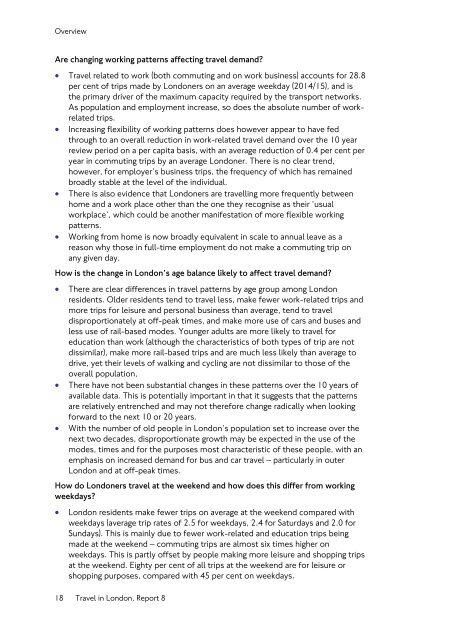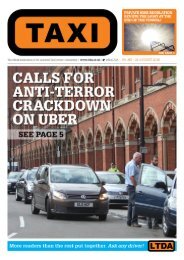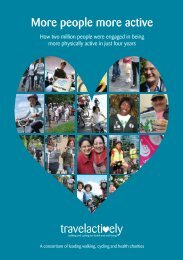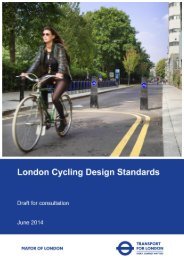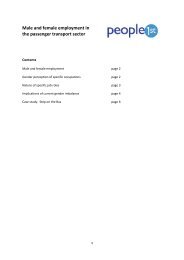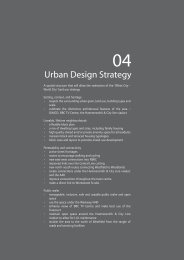Travel in London Travel in London
travel-in-london-report-8
travel-in-london-report-8
You also want an ePaper? Increase the reach of your titles
YUMPU automatically turns print PDFs into web optimized ePapers that Google loves.
Overview<br />
Are chang<strong>in</strong>g work<strong>in</strong>g patterns affect<strong>in</strong>g travel demand?<br />
• <strong>Travel</strong> related to work (both commut<strong>in</strong>g and on work bus<strong>in</strong>ess) accounts for 28.8<br />
per cent of trips made by <strong>London</strong>ers on an average weekday (2014/15), and is<br />
the primary driver of the maximum capacity required by the transport networks.<br />
As population and employment <strong>in</strong>crease, so does the absolute number of workrelated<br />
trips.<br />
• Increas<strong>in</strong>g flexibility of work<strong>in</strong>g patterns does however appear to have fed<br />
through to an overall reduction <strong>in</strong> work-related travel demand over the 10 year<br />
review period on a per capita basis, with an average reduction of 0.4 per cent per<br />
year <strong>in</strong> commut<strong>in</strong>g trips by an average <strong>London</strong>er. There is no clear trend,<br />
however, for employer’s bus<strong>in</strong>ess trips, the frequency of which has rema<strong>in</strong>ed<br />
broadly stable at the level of the <strong>in</strong>dividual.<br />
• There is also evidence that <strong>London</strong>ers are travell<strong>in</strong>g more frequently between<br />
home and a work place other than the one they recognise as their ‘usual<br />
workplace’, which could be another manifestation of more flexible work<strong>in</strong>g<br />
patterns.<br />
• Work<strong>in</strong>g from home is now broadly equivalent <strong>in</strong> scale to annual leave as a<br />
reason why those <strong>in</strong> full-time employment do not make a commut<strong>in</strong>g trip on<br />
any given day.<br />
How is the change <strong>in</strong> <strong>London</strong>’s age balance likely to affect travel demand?<br />
• There are clear differences <strong>in</strong> travel patterns by age group among <strong>London</strong><br />
residents. Older residents tend to travel less, make fewer work-related trips and<br />
more trips for leisure and personal bus<strong>in</strong>ess than average, tend to travel<br />
disproportionately at off-peak times, and make more use of cars and buses and<br />
less use of rail-based modes. Younger adults are more likely to travel for<br />
education than work (although the characteristics of both types of trip are not<br />
dissimilar), make more rail-based trips and are much less likely than average to<br />
drive, yet their levels of walk<strong>in</strong>g and cycl<strong>in</strong>g are not dissimilar to those of the<br />
overall population,<br />
• There have not been substantial changes <strong>in</strong> these patterns over the 10 years of<br />
available data. This is potentially important <strong>in</strong> that it suggests that the patterns<br />
are relatively entrenched and may not therefore change radically when look<strong>in</strong>g<br />
forward to the next 10 or 20 years.<br />
• With the number of old people <strong>in</strong> <strong>London</strong>’s population set to <strong>in</strong>crease over the<br />
next two decades, disproportionate growth may be expected <strong>in</strong> the use of the<br />
modes, times and for the purposes most characteristic of these people, with an<br />
emphasis on <strong>in</strong>creased demand for bus and car travel – particularly <strong>in</strong> outer<br />
<strong>London</strong> and at off-peak times.<br />
How do <strong>London</strong>ers travel at the weekend and how does this differ from work<strong>in</strong>g<br />
weekdays?<br />
• <strong>London</strong> residents make fewer trips on average at the weekend compared with<br />
weekdays (average trip rates of 2.5 for weekdays, 2.4 for Saturdays and 2.0 for<br />
Sundays). This is ma<strong>in</strong>ly due to fewer work-related and education trips be<strong>in</strong>g<br />
made at the weekend – commut<strong>in</strong>g trips are almost six times higher on<br />
weekdays. This is partly offset by people mak<strong>in</strong>g more leisure and shopp<strong>in</strong>g trips<br />
at the weekend. Eighty per cent of all trips at the weekend are for leisure or<br />
shopp<strong>in</strong>g purposes, compared with 45 per cent on weekdays.<br />
18 <strong>Travel</strong> <strong>in</strong> <strong>London</strong>, Report 8


